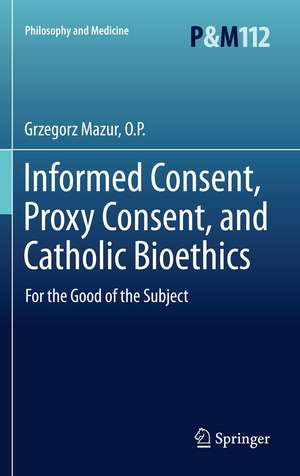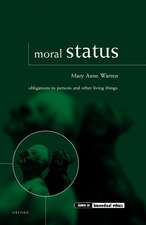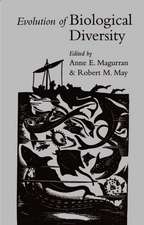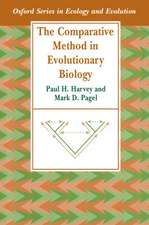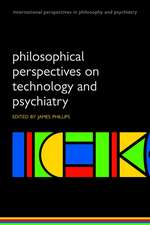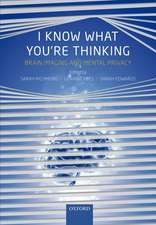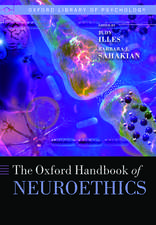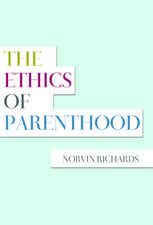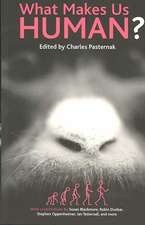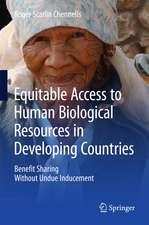Informed Consent, Proxy Consent, and Catholic Bioethics: For the Good of the Subject: Philosophy and Medicine, cartea 112
Autor Grzegorz Mazur, O.P.en Limba Engleză Paperback – 27 noi 2013
| Toate formatele și edițiile | Preț | Express |
|---|---|---|
| Paperback (1) | 557.46 lei 38-44 zile | |
| SPRINGER NETHERLANDS – 27 noi 2013 | 557.46 lei 38-44 zile | |
| Hardback (1) | 643.34 lei 6-8 săpt. | |
| SPRINGER NETHERLANDS – 22 sep 2011 | 643.34 lei 6-8 săpt. |
Din seria Philosophy and Medicine
- 18%
 Preț: 3071.11 lei
Preț: 3071.11 lei - 18%
 Preț: 789.52 lei
Preț: 789.52 lei - 15%
 Preț: 636.80 lei
Preț: 636.80 lei - 15%
 Preț: 643.16 lei
Preț: 643.16 lei - 15%
 Preț: 644.95 lei
Preț: 644.95 lei - 18%
 Preț: 949.23 lei
Preț: 949.23 lei - 5%
 Preț: 1154.22 lei
Preț: 1154.22 lei - 18%
 Preț: 1223.74 lei
Preț: 1223.74 lei - 15%
 Preț: 645.60 lei
Preț: 645.60 lei - 18%
 Preț: 949.23 lei
Preț: 949.23 lei - 15%
 Preț: 644.49 lei
Preț: 644.49 lei - 18%
 Preț: 948.79 lei
Preț: 948.79 lei - 24%
 Preț: 780.13 lei
Preț: 780.13 lei - 18%
 Preț: 1227.04 lei
Preț: 1227.04 lei -
 Preț: 395.85 lei
Preț: 395.85 lei - 5%
 Preț: 1103.95 lei
Preț: 1103.95 lei - 18%
 Preț: 945.30 lei
Preț: 945.30 lei - 18%
 Preț: 1383.94 lei
Preț: 1383.94 lei - 15%
 Preț: 643.34 lei
Preț: 643.34 lei - 18%
 Preț: 1130.45 lei
Preț: 1130.45 lei - 15%
 Preț: 640.55 lei
Preț: 640.55 lei - 15%
 Preț: 639.59 lei
Preț: 639.59 lei -
 Preț: 389.70 lei
Preț: 389.70 lei - 18%
 Preț: 948.61 lei
Preț: 948.61 lei - 5%
 Preț: 1092.79 lei
Preț: 1092.79 lei - 15%
 Preț: 642.36 lei
Preț: 642.36 lei -
 Preț: 385.08 lei
Preț: 385.08 lei - 15%
 Preț: 644.95 lei
Preț: 644.95 lei
Preț: 557.46 lei
Preț vechi: 696.82 lei
-20% Nou
Puncte Express: 836
Preț estimativ în valută:
106.68€ • 115.84$ • 89.61£
106.68€ • 115.84$ • 89.61£
Carte tipărită la comandă
Livrare economică 18-24 aprilie
Preluare comenzi: 021 569.72.76
Specificații
ISBN-13: 9789400737150
ISBN-10: 9400737157
Pagini: 260
Ilustrații: XVI, 244 p.
Dimensiuni: 155 x 235 x 14 mm
Greutate: 0.37 kg
Ediția:2012
Editura: SPRINGER NETHERLANDS
Colecția Springer
Seriile Philosophy and Medicine, Catholic Studies in Bioethics
Locul publicării:Dordrecht, Netherlands
ISBN-10: 9400737157
Pagini: 260
Ilustrații: XVI, 244 p.
Dimensiuni: 155 x 235 x 14 mm
Greutate: 0.37 kg
Ediția:2012
Editura: SPRINGER NETHERLANDS
Colecția Springer
Seriile Philosophy and Medicine, Catholic Studies in Bioethics
Locul publicării:Dordrecht, Netherlands
Public țintă
ResearchCuprins
1. Introduction.- 2. Chapter 1 : The historical development of the principle of free and informed consent debate on the origin of the principle of free and informed consent in medical and research practices.- 3. Chapter 2: The articulation of the principle of free and informed consent in human-rights documents.- 4.Conclusions.- 5. Chapter 3: The major current interpretations of the principle of free and informed consent.- 6. Chapter 4: Introduction to the issue of proxy consent.- 7. Chapter 5: Standards for proxy consent in the therapeutic situation.- 8. Chapter 6: Critique of proxy consent standards.- 9. Chapter 7: The golden rule and proxy decision making.- 10. Chapter 8: Preliminary considerations on proxy consent in the nontherapeutic situation.- 11.Conclusions.- 12. Chapter 9: Proxy consent in nontherapeutic settings.- 13. Chapter 10: Analysis.-
14. Chapter 1: Resolution of issues related to proxy decision making.- 15. Conclusions.
14. Chapter 1: Resolution of issues related to proxy decision making.- 15. Conclusions.
Recenzii
From the reviews:
“This book presents an in-depth analysis of informed consent and proxy consent … and offers a robust anthropology and virtue ethic consistent with Roman Catholic teaching to justify and guide these principles. … The book is researched and written at a high academic level, but it is also very accessible and would be appropriate for philosophers, bioethicists, physicians, researchers, students, and interested readers. … this book is wonderfully refreshing in its analysis, argumentation, and thesis. … an important work in both secular and Catholic bioethics.” (Gina M. Fullam, Doody’s Review Service, May, 2011)
“This book presents an in-depth analysis of informed consent and proxy consent … and offers a robust anthropology and virtue ethic consistent with Roman Catholic teaching to justify and guide these principles. … The book is researched and written at a high academic level, but it is also very accessible and would be appropriate for philosophers, bioethicists, physicians, researchers, students, and interested readers. … this book is wonderfully refreshing in its analysis, argumentation, and thesis. … an important work in both secular and Catholic bioethics.” (Gina M. Fullam, Doody’s Review Service, May, 2011)
Textul de pe ultima copertă
This work offers a comprehensive understanding rooted in Catholic anthropology and moral theory of the meaning and limits of informed and proxy consent to experimentation on human subjects. In particular, it seeks to articulate the rationale for proxy consent in both therapeutic and nontherapeutic settings. As to the former, the book proposes that the Golden Rule, recognizing the basic inclinations of human nature toward objective goods perfective of human persons, should underpin the notion of proxy consent to experimentation on humans. As to the latter, an additional scrutiny of the amount of risk involved is necessary, since the risk-benefit ratio frequently invoked to justify higher-risk therapeutic research does not exist in its nontherapeutic counterpart. This study discusses a number of possible solutions to this question and develops a position that builds upon the objective notion of the human good.
Caracteristici
Offers a deeper and broader understanding of informed consent and proxy consent from the perspective of Christian ethics Assists those in the medical field understand and critically evaluate certain relatively recent and problematic approaches to consent in healthcare Provides an overview and analysis of the debates on informed and proxy consent in present-day American bioethical literature Provides the reader a background essential for a thorough understanding of the matter.
